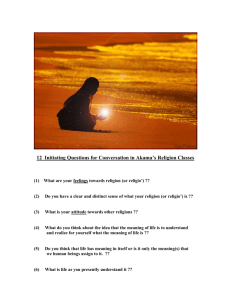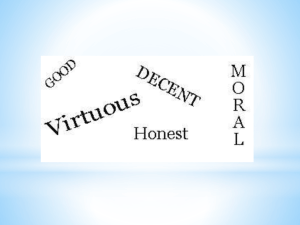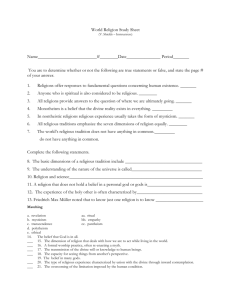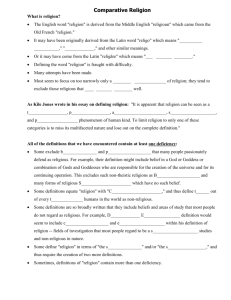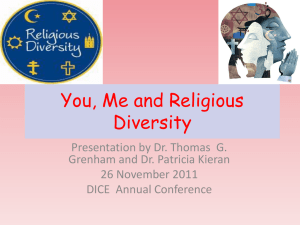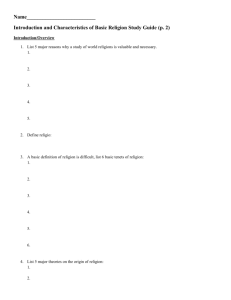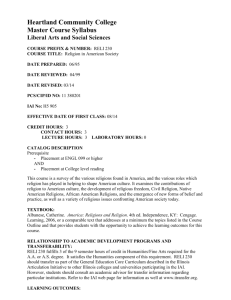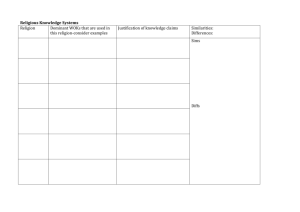DefinitionsReligion_..
advertisement
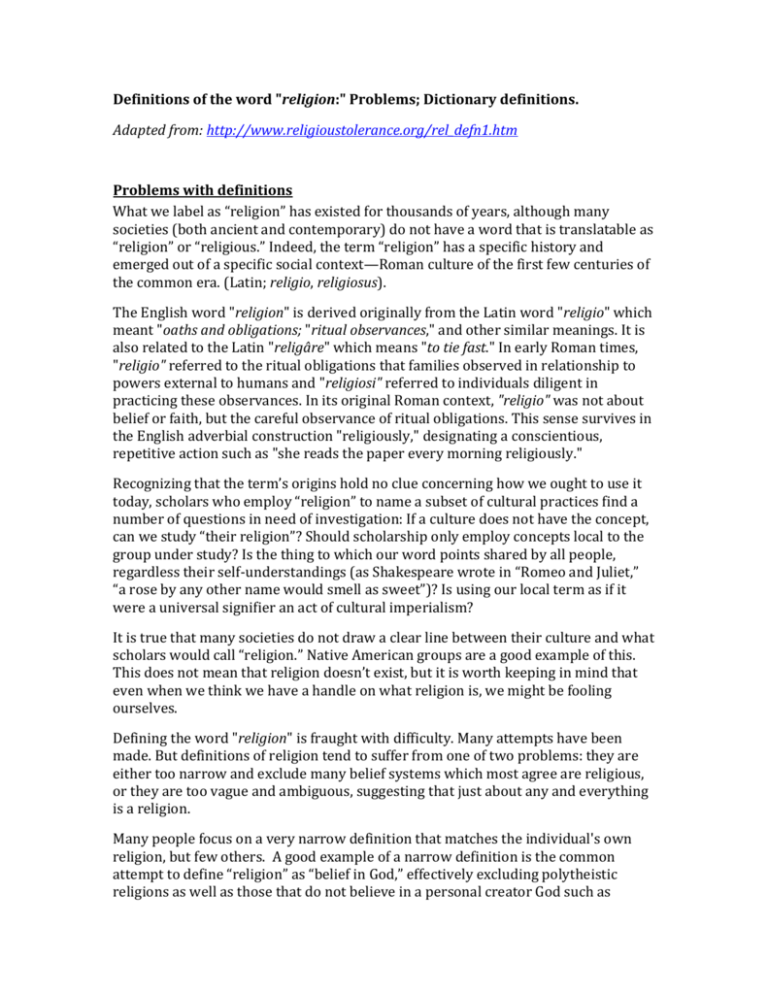
Definitions of the word "religion:" Problems; Dictionary definitions. Adapted from: http://www.religioustolerance.org/rel_defn1.htm Problems with definitions What we label as “religion” has existed for thousands of years, although many societies (both ancient and contemporary) do not have a word that is translatable as “religion” or “religious.” Indeed, the term “religion” has a specific history and emerged out of a specific social context—Roman culture of the first few centuries of the common era. (Latin; religio, religiosus). The English word "religion" is derived originally from the Latin word "religio" which meant "oaths and obligations; "ritual observances," and other similar meanings. It is also related to the Latin "religâre" which means "to tie fast." In early Roman times, "religio" referred to the ritual obligations that families observed in relationship to powers external to humans and "religiosi" referred to individuals diligent in practicing these observances. In its original Roman context, "religio" was not about belief or faith, but the careful observance of ritual obligations. This sense survives in the English adverbial construction "religiously," designating a conscientious, repetitive action such as "she reads the paper every morning religiously." Recognizing that the term’s origins hold no clue concerning how we ought to use it today, scholars who employ “religion” to name a subset of cultural practices find a number of questions in need of investigation: If a culture does not have the concept, can we study “their religion”? Should scholarship only employ concepts local to the group under study? Is the thing to which our word points shared by all people, regardless their self-understandings (as Shakespeare wrote in “Romeo and Juliet,” “a rose by any other name would smell as sweet”)? Is using our local term as if it were a universal signifier an act of cultural imperialism? It is true that many societies do not draw a clear line between their culture and what scholars would call “religion.” Native American groups are a good example of this. This does not mean that religion doesn’t exist, but it is worth keeping in mind that even when we think we have a handle on what religion is, we might be fooling ourselves. Defining the word "religion" is fraught with difficulty. Many attempts have been made. But definitions of religion tend to suffer from one of two problems: they are either too narrow and exclude many belief systems which most agree are religious, or they are too vague and ambiguous, suggesting that just about any and everything is a religion. Many people focus on a very narrow definition that matches the individual's own religion, but few others. A good example of a narrow definition is the common attempt to define “religion” as “belief in God,” effectively excluding polytheistic religions as well as those that do not believe in a personal creator God such as Buddhism. A humorous case is in Henry Fielding's novel "Tom Jones." where he has one character say: "By religion I mean Christianity, by Christianity I mean Protestantism, by Protestantism I mean the Church of England as established by law." Other definitions are so broad that they can include things that are not typically considered religion. A good example of a vague definition is the tendency to define religion as "ultimate meaning“ or "worldview.” But "ultimate meaning" can be anything that a person takes to be of overriding importance in their life while Marxism, nationalism, science and philosophy are examples of worldviews that most people would not consider religious. All of the definitions that we have encountered contain at least one deficiency: Some exclude beliefs and practices that many people passionately defend as religious. For example, their definition might require a belief in a God or Goddess or combination of Gods and Goddesses who are responsible for the creation of the universe and for its continuing operation. This excludes such non-theistic religions as Buddhism and liberal forms of Judaism that do not require belief in God(s) for membership. Some definitions equate "religion" with "Christianity," and thus define two out of every three humans in the world as non-religious. Some definitions are so broadly written that they include beliefs or areas of study that most people do not regard as religious. For example, David Edward's assertion that the "sum total of answers we give to the problem of our relationship with the universe, we call religion" would seem to include cosmology, astronomy & ecology within his definition of religion -- fields of investigation that most people regard to be a scientific studies and nonreligious in nature. Some define "religion" in terms of "the sacred" and/or "the spiritual," and thus require two additional terms to be defined. Sometimes, definitions of "religion" contain more than one of these deficiencies. Consider, for example, the following examples of dictionary definitions of the word religion. Dictionary definitions 1. Barns & Noble (Cambridge) Encyclopedia (1990): "...no single definition will suffice to encompass the varied sets of traditions, practices, and ideas which constitute different religions." In effect, this definition refuses to give a definition. 2. The Concise Oxford Dictionary (1990): "Human recognition of superhuman controlling power and especially of a personal God entitled to obedience" This definition would not consider some Buddhist groups as religions. Many Unitarian Universalists and progressive Christians are excluded by this description. Strictly interpreted, it would also reject polytheistic religions, since it refers to "a" personal God." 3. Merriam-Webster's Online Dictionary: "a cause, principle, or system of beliefs held to with ardor and faith." This is a curious definition -- we would have said nonsensical, except that that would be too judgmental -- because it does not require elements often associated with religion, such as deity, morality, worldview, etc. Capitalism, homophobia, transphobia, President Obama's place of birth, and other beliefs might fit this definition. Also it requires that a person pursue their religion with enthusiasm. Many people identify themselves with a specific religion, but are not intensely engaged with their faith. 4. Webster's New World Dictionary (Third College Edition): "any specific system of belief and worship, often involving a code of ethics and a philosophy." This definition would exclude religions that do not engage in worship. It implies that there are two important components to religion: one's belief and worship in a deity or deities one's ethical behavior towards other persons Some have argued that religion isn’t hard to define and the plethora of conflicting definitions is evidence of how easy it really is. The problem lies in finding a definition that is empirically useful and empirically testable.
